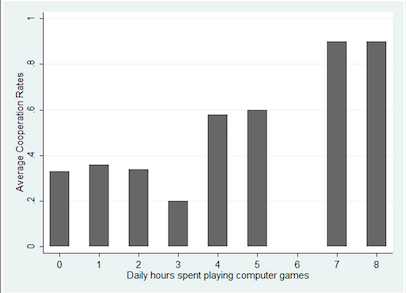Here's what seems to me a a slightly counter-intuitive result. Numerous studies have a noted a correlation between playing violent computer games and less prosocial behavior, and studies of games involving cooperation correlate with more prosocial behaviors. Most of these studies have observed behaviors immediately after palying the games. Mengel takes a more neutral approach and simply asks whether there is a correlation between average daily time spent playing any sort of computer game and prosocial behavior assayed with the Prisoner's dilemma game over 10 different periods, with participating students also reporting on their daily computer use. They find the average cooperation rate is positively correlated with the self-reported amount of time participants spend playing computer games. None of the other computer time use variables (including time spent on social media, browsing internet, working etc.) are significantly related to cooperation rates. (So...either cooperative students are more likely to spend a lot of time on computer games, or computer games enhance cooperative behavior... or... neither of the above.)


